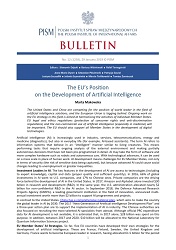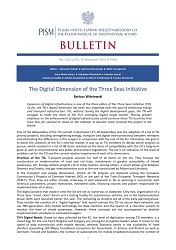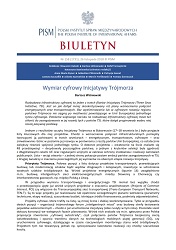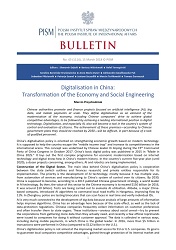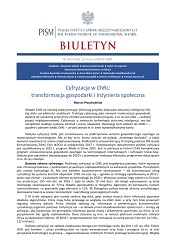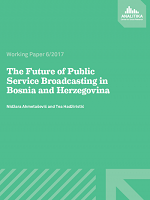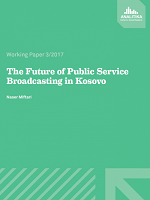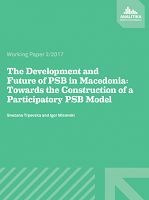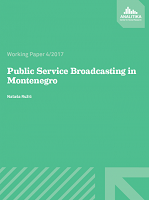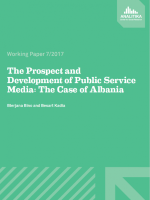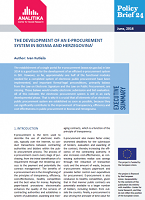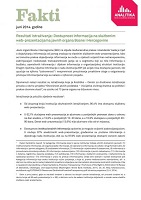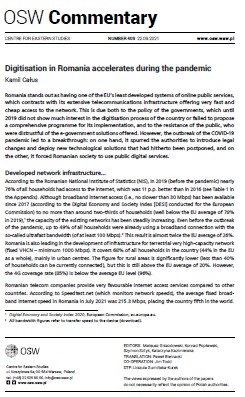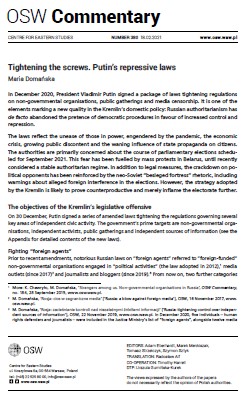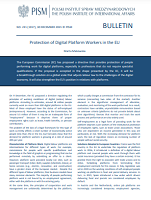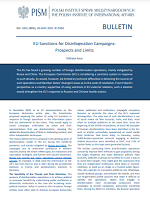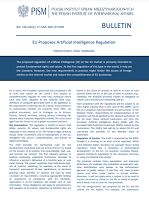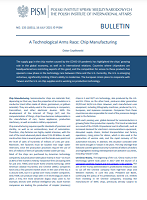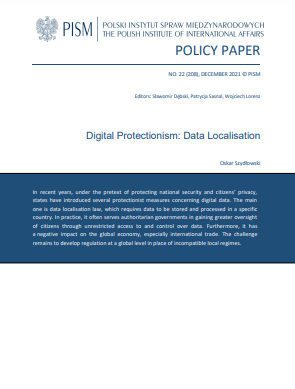Author(s): Nataša Ružić / Language(s): English
The aim of this paper is to examine the status and operation of the public service broadcaster in Montenegro and the process of transformation of the state-controlled Radio Television of Montenegro (Radio i Televizija Crne Gore, or RTCG) into a public service broadcaster. The paper elaborates on the current situation with RTCG and attempts to provide insights into the prospects for its future, in the context of contemporary European and local debates, tackling the obstacles, challenges and changing policy streams when it comes to public media. In doing so, special attention is given to the political, economic and social factors that influence the transformation of the state broadcaster in Montenegro. The former state controlled broadcaster was formally established as a PSB in 2002, and this is when the transformation process started. The path towards the development of PSB was not an easy task given the complex contextual factors and obstacles that RTCG faced. The former state broadcaster RTCG, remembered for the dissemination of hate speech during the Yugoslav wars during the 1990s, for political obedience to the ruling party and for its financial ruin, was suddenly supposed to transform itself into a geniune PSB to serve primarily the citizens of Montenegro. Moreover, such a transformation was happening in an extremely complex political and economic context: the country found itself in the midst of democratization and liberalization processes, while at the same time negotiating its accession to the EU. The financial crisis put immense pressure on the government and the media market, limiting the scope of any intervention that aimed at the sustainable institutional transformation of RTCG. Taking these contextual factors, and the dynamics they produced, into consideration, this paper attempts to answer three sets of questions. First, how the initial media policy and regulations in regard to PSB were adopted, who the main actors were in the process (considering the EU influence), and how these actors interacted with each other. Second, what is the current situation with the PSB regarding the implementation of policies and reforms, giving special attention to the PSB remit, funding model, formal and de-facto independence, market share, and progress regarding the digital switchover in Montenegro. And, finally, what are the key challenges for the future development of PSB in Montenegro, taking into account the impact of new technologies, convergence and digitalization on the prospects of the PSB in the rapidly changing multi-channel environment. Another aspect of interest to this study is that of the influence of the EU on the national media policy due to the competition approach of the EU. Last but not least, this research question also relates to the overall changes in the broadcasting market, with the proliferation of new media platforms and the increased commercialization of broadcasting. In order to answer these questions, the paper heavily relies on contemporary scholarly debates on the future prospects of PSB, especially drawing upon the analysis and theoretical propositions by Jakubowicz , Picard and Siciliani , Rumphorst , Moe , Hallin and Mancini. Furthermore, special attention is given to the role, function and prospects of PSB in post-communist, transitional societies as analyzed in the works of Car and Veljanovski. In the search for an answer on the abovementioned questions, the paper provides an analysis of the existing legislation, as well as semi-structured interviews with members of the administrative bodies of the public service broadcaster and media experts in Montenegro. This paper presents the argument that the former state-owned media company in Montenegro was not fully transformed into a public service broadcaster. After taking into consideration the key debates, contextual factors, and contemporary trends relevant to the development of a PSB, paper argues that the transformation of the state-broadcaster into a genuine PSB in Montenegro has so far not been successful. As will be demonstrated, the PSB remains a highly politicized and dysfunctional institution, while policy debates are centered mainly around basic issues of financial sustainability and political (in)dependence. At the same time, there is no substantial debate on the role of PSB in the society, its relevance in the convereged digital environment, and its public service function. Given the current situation, the future of PSB in Montenegro seems bleak, to say the least. The paper consists of five sections. In the first part of this paper the PSB is analyzed from a theoretical point of view, while in the second part of the paper the process of transformation of RTCG as a state media into a public service broadcaster is considered. The second chapter will deal with the definition of public service broadcasting and basic characteristics of this system, including analysis of debates on the global and local levels, outlining the opposing views of theorists and international organizations concerning legislation, models of funding, remit debate and technology debate. The following subsections present debates on PSB in the countries of the Western Balkans, as well as a methodological framework used for research and analysis. In the third chapter the paper will present the public service broadcaster in Montenegro and identify the problems faced by this media outlet. In the fourth chapter we will analyze the legislation in Montenegro, the funding of the PSB, the process of digitalizing and the sociological, cultural and political aspects in which the public service broadcaster is trying to operate. The concluding chapters include a discussion of the main findings, final remarks and recommendations.
More...


